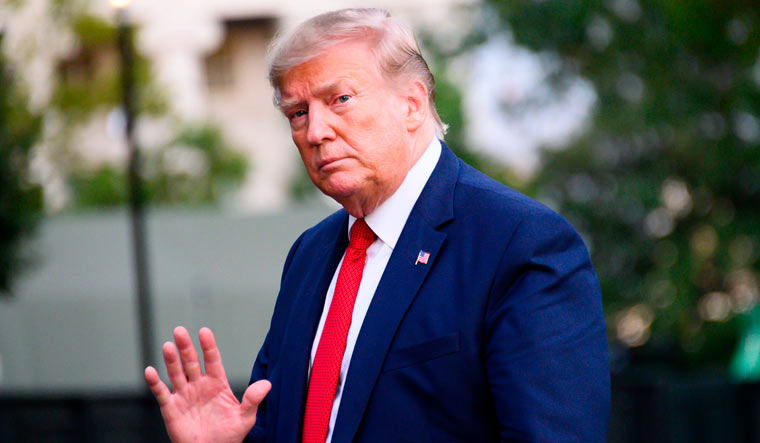Amidst facing trouble with Iran, US President Donald Trump heads to UN on a three-day visit. And while there, he hopes to lean on strained alliances while fending off questions about whether he sought foreign help to damage a political rival.
also read
- Russian flamethrowers repel Ukraine's ground op in Kharkiv, Kyiv's F-16 shot down above Krasnoyarsk, claims pro-Putin war journalist
- Was Badar Khan Suri, the Indian researcher held in US, 'punished' for his wife's Palestinian links?
- Was the Chicago mob behind John F Kennedy assassination? JFK files hint at mafia conspiracy
Trump's UN trip comes after nearly three years of an "America First" foreign policy that has unsettled allies and shredded multinational pacts. On UN's schedule will be a Monday session on climate change that Trump plans to skip.
He will instead address a meeting about the persecution of religious minorities, particularly Christians, an issue that resonates with Trump's evangelical supporters.
The most anticipated meeting on the schedule is a meeting with the President of Ukraine, Volodymyr Zelenskiy. Until a week ago, a one-on-one meeting with Ukrainian president Volodymyr Zelenskiy would have been seen largely as an afterthought.
Trump, according to a source, had pressed Ukraine's president to investigate Democratic presidential candidate Joe Biden's son during a call earlier this summer. Trump asked Zelenskiy to investigate Biden's son Hunter about his dealings with energy company Burisma. Trump, however, did not discuss a pending military aid package allegedly promised to the country during the call.
Trump is also slated to meet leaders of Pakistan, Poland, New Zealand, Singapore, Egypt, South Korea, UK, Iraq, Japan and El Salvador.
The president arrived in New York on Sunday against a backdrop of swirling international tensions, including questions about his relationship with Ukraine, the uncertain future of Brexit, the US trade war with China, stalled nuclear negotiations with North Korea and a weakening global economy. The most immediate challenge for the president maybe Iran.
"Nothing is ever off the table completely, but I have no intention of meeting with Iran," Trump said Sunday as he left the White House. "But I'm a flexible person. We are meeting with a lot of leaders. We have about 15 meetings set up. But Iran is not one of them," Trump said.
He will try to convince sceptical global capitals to help build a coalition to confront Tehran after the United States blamed it for last week's strike at a Saudi Arabia oil field.
"Well, I always like a coalition," Trump said Friday, before going on to complain that under the old Iran nuclear deal, "everyone else is making money and we're not."
Trump's fulfilment of a campaign promise to exit the Iran nuclear deal has had wide ripple effects, leading Tehran to bolster its nuclear capabilities and dismaying European capitals who worked to establish the original agreement.
Trump is also expected to address the General Assembly on Tuesday morning. His theme this year, according to aides, will be to reassert America's determination to uphold its sovereignty and independence, especially on issues of national security.
Tensions between Washington and Tehran spiked after a Saudi Arabia oil field was partially destroyed in an attack that Secretary of State Mike Pompeo blamed on Iran and deemed "an act of war." Now Trump will try to enlist wary world leaders in a collective effort to contain Iran.
Trump said he was concerned about corruption; Democrats frame his actions as an effort to pressure Zelenskiy to dig up damaging material on a potential 2020 rival.
Trump is defending himself against the intelligence official's complaint, asserting that it comes from a "partisan whistleblower," though the president also said he doesn't know the whistleblower's identity.
Other concerns in the mix during Trump's visit include the US' trade war with China.
China's Xi Jinping is not expected to attend, nor are several other prominent world leaders, like Vladimir Putin and Israeli Prime Minister Benjamin Netanyahu.



